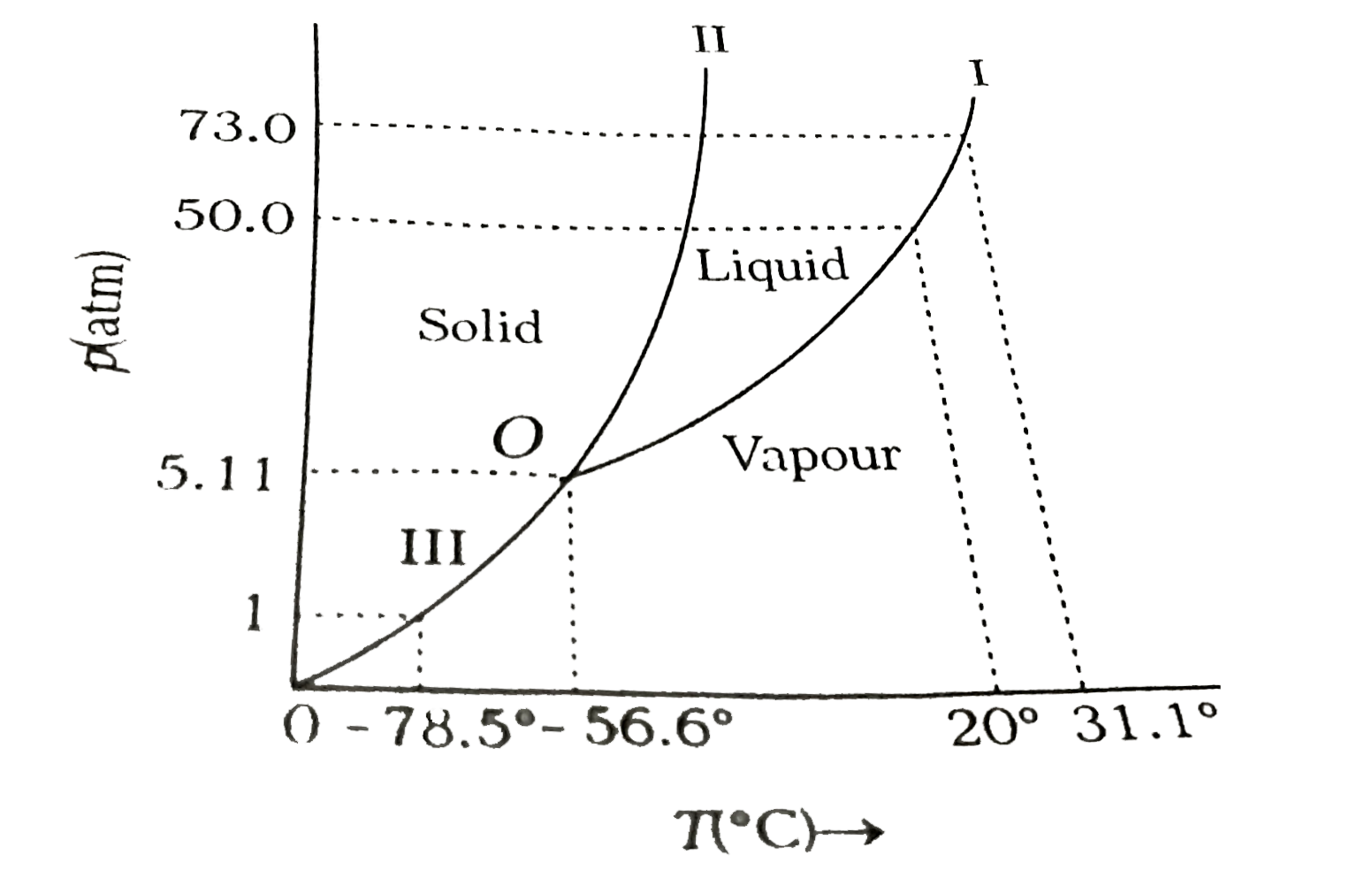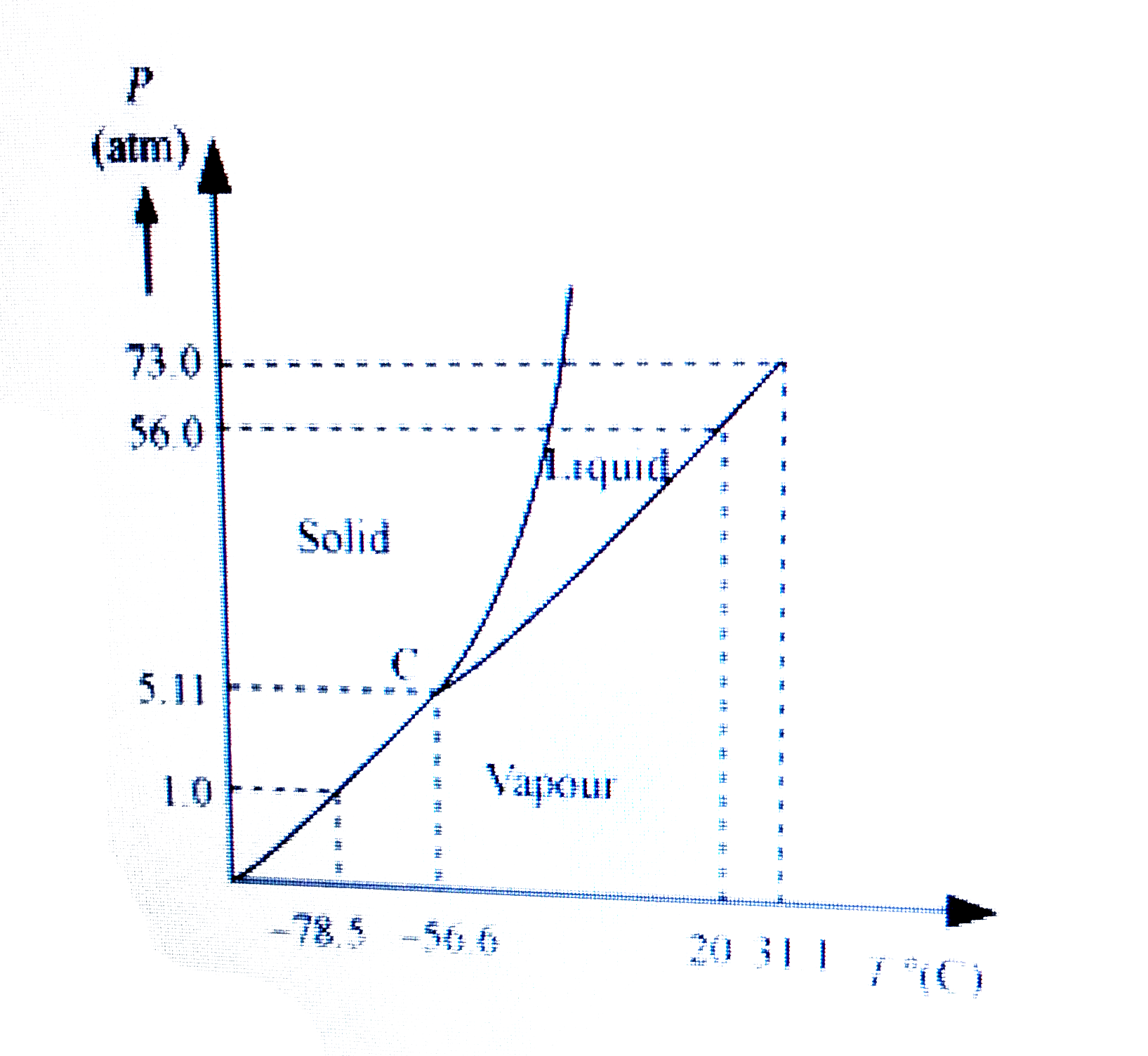Answer the following questions based on the P – T phase diagram of CO2:
(a) CO2 at 1 atm pressure and temperature–60∘C is compressed isothermally. Does it go through a liquid phase ?
(b) What happens when CO2 at 4 atm pressure is cooled from room temperature at constant pressure ?
(c) Describe qualitatively the changes in a given mass of solid CO2 at 10 atm pressure and temperature –65∘C as it is heated up to room temperature at constant pressure.
(d) CO2 is heated to a temperature 70∘C and compressed isothermally. What changes in its properties do you expect to observe ?

Answer:
(a) No
(b) It condenses to solid directly.
(c) The fusion and boiling points are given by the intersection point where this parallel line cuts the fusion and vaporisation curves.
(d) It departs from ideal gas behaviour as pressure increases.
Explanation:
(a) The P–T phase diagram for CO2 is shown in the following figure.

At 1 atm pressure and at –60∘C,CO2 lies to the left of –56.6∘C (triple point C). Hence, it lies in the region of vaporous and solid phases.
Thus, CO2 condenses into the solid state directly, without going through the liquid state.
(b) At 4 atm pressure, CO2 lies below 5.11 atm (triple point C). Hence, it lies in the region of vaporous and solid phases. Thus, it condenses into the solid state directly, without passing through the liquid state.
(c) When the temperature of a mass of solid CO2 (at 10 atm pressure and at –65∘C) is increased, it changes to the liquid phase and then to the vaporous phase. It forms a line parallel to the temperature axis at 10 atm. The fusion and boiling points are given by the intersection point where this parallel line cuts the fusion and vaporisation curves.
(d) If CO2 is heated to 70∘C and compressed isothermally, then it will not exhibit any transition to the liquid state. This is because 70∘C is higher than the critical temperature of CO2. It will remain in the vapour state, but will depart from its ideal behaviour as pressure increases.
Topper's Solved these Questions
- THERMAL PROPERTIES OF MATTERBOOK - NCERT ENGLISHCHAPTER - THERMAL PROPERTIES OF MATTEREXERCISE - EXERCISE
22 Videos
- SYSTEMS OF PARTICLES AND ROTATIONAL MOTIONBOOK - NCERT ENGLISHCHAPTER - SYSTEMS OF PARTICLES AND ROTATIONAL MOTIONEXERCISE - EXERCISE
33 Videos
- THERMODYNAMICSBOOK - NCERT ENGLISHCHAPTER - THERMODYNAMICSEXERCISE - EXERCISE
10 Videos
Similar Questions
One mole of SO2 at 298K and 1atm pressure is heated in a closed vessel so that its temperature is 475K and pressure is 4atm. It is then cooled so that temperature becomes 298K and pressure is 1atm. What is that change in the internal energy of the gas?
View SolutionSodium phenoxide reacts with CO2 at 400K and 4−7 atm pressure to give
View Solution
Knowledge Check
What is the density of CO2 at 27.∘C and 2.5 atm pressure ?
A5.2gL−1B6.2gL−1C7.3gL−1D4.46gL−1
An ideal gas at a pressure of 1 atm and temperature of 27∘C is compressed adiabatically until its pressure becomes 8 times the initial pressure , then final temperature is (γ=32)
View SolutionThe temperature and pressure of one mole of an ideal monoatomic gas changes from 25∘ C and 1 atm pressure to 250∘ C and 25 atm. Calculate the change in entropy for the process.
View SolutionName the major product formed when sodium phenoxide is heated with CO2 at 400 Kunder 4-7 atm. pressure. What is the name of the reaction?
View SolutionOne mole of an ideal gas (Cv,m=52R) at 300 K and 5 atm is expanded adiabatically to a final pressure of 2 atm against a constant pressure of 2 atm. Final temperature of the gas is :
View SolutionAnswer the following questions based on the p-T phase diagram of carbon dioxide as shown in the figure .
(i) At what temperature and pressure can the solid , liquid and vapour phases of C02 co-exist in equilibrium?
(ii) What is the effect of decrease of pressure on the fusion and boiling point of C02 ?
(iii) What are the critical temperature and pressure for C02 ? what is their significance ?
(iv) Is C02 solid , liquid, or gas at (a) −70∘Cunder 1 atm (b) −60∘C under 10 atm (c) 15∘C under 56 atm ?

View SolutionAnswer the following questions based on the p-T phase diagram of carbon dioxide as shown in the figure .
(i) At what temperature and pressure can the solid , liquid and vapour phases of C02 co-exist in equilibrium?
(ii) What is the effect of decrease of pressure on the fusion and boiling point of C02 ?
(iii) What are the critical temperature and pressure for C02 ? what is their significance ?
(iv) Is C02 solid , liquid, or gas at (a) −70∘Cunder 1 atm (b) −60∘C under 10 atm (c) 15∘C under 56 atm ?

View SolutionThe critical temperature (Tc) and critical pressure (pc) of CO2 are 30.98∘C and 73 atm respectively. Can CO2(g) be liquefied at 32∘C and 80 atm pressure ?
View Solution